英语朗读常见技巧ppt课件
英语连读规律(很全面)ppt课件
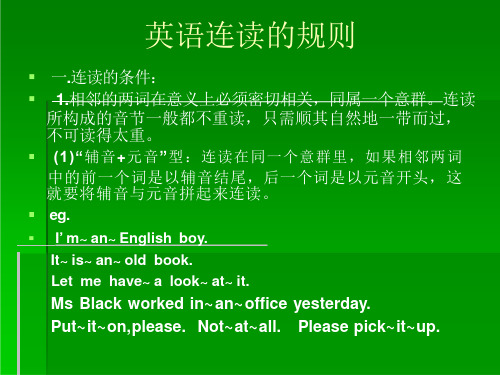
▪
There~ are some books on the desk.
▪
Here~is a letter for you.
▪
Here~are four~eggs.
▪
But where~is my cup?
▪
Where~ are your brother~ and sister?
▪
但 是 , 如 果 一 个 音 节 的 前 后 都 有 字 母 r, 即 使 后 面 的
▪ 1 w a lk a c r o s s th e s tr e e t
▪1 ▪1
o n a fo g g y d a y
a s t u d e n t i n t h e E n g l i s h Department
▪1 ▪1
in o u r c la s s r o o m
eDepartment t a l k w i t h a f r i e n d o f m i n
cinema.
▪
I wen( t) there alone a( t) nine las( t) night.
▪
- Do you know his bi( ke) number? - Sorry, I
don’ ( t) know.
▪
The forty- firs( t) lesson is qui( te)
▪ (2)“爆破音+摩擦音”型:如果前面是爆破音, 其
后 紧 跟 着 某 些 摩 擦 音 ( 如 / f/ , / s/ , / W/ ,/ T/ 等 ) ,
那么前面那个爆破音仅有十分轻微的爆破,而后 面那个摩擦音则要完全爆破。
eg. Goo(d) morning, Mr. Bell.
英语连读技巧和练习 PPT

如果重音不在最后一个音节上,声音直接落下来。 Examples: I’ll call the doctor. There are several factors. She bought an umbrella. The air in the city is very dirty. Cars are most likely to substitute bicycles in the
future. Your efforts and self-confidence would prove to be
fruitful. Money can’t buy anything.
并列成串的词的语调
and前升,and后降
apples, bananas, and oranges
speak, read, and write
I’m very surprised.)
特殊疑问句的升调语气 特殊疑问句的升调语气是用来使对话方重复其所讲的
话,因此不能随便乱用。 使用升调的情况 特殊疑问句一般用降调,其功能是用来索取信息。
What’s her name? Where does she live?
Marie. In Paris.
pen, paper, and ink
TV, radio, and refrigerator
classroom, library, and office
solid, liquid, and gas
升调:很多中国同学升调读不准,或发音古怪,根 本原因在于没有将重音读准,句子的升调应该从句子 重音这个点上把调拔起来,而不是随意一升,或从后 面的单词上升起来的。
英语连读技巧和练习
Come in / work out / good idea / think of it Speak English / first of all / not at all / all of us/ look at it
高中英语读音规则朗读技巧课件(共52张PPT)
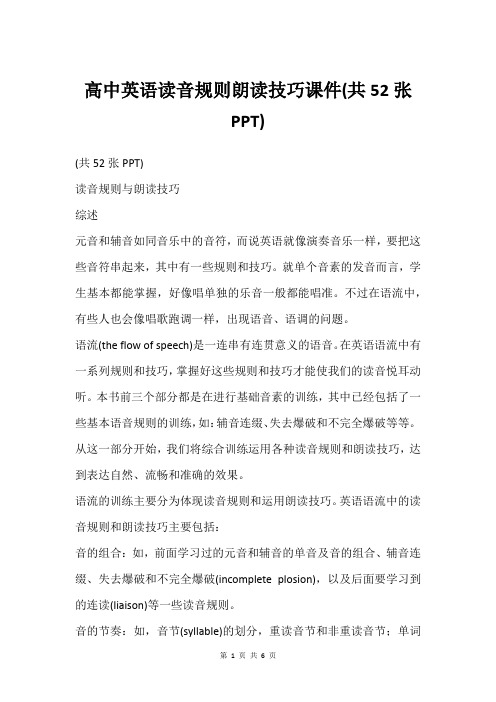
高中英语读音规则朗读技巧课件(共52张PPT)(共52张PPT)读音规则与朗读技巧综述元音和辅音如同音乐中的音符,而说英语就像演奏音乐一样,要把这些音符串起来,其中有一些规则和技巧。
就单个音素的发音而言,学生基本都能掌握,好像唱单独的乐音一般都能唱准。
不过在语流中,有些人也会像唱歌跑调一样,出现语音、语调的问题。
语流(the flow of speech)是一连串有连贯意义的语音。
在英语语流中有一系列规则和技巧,掌握好这些规则和技巧才能使我们的读音悦耳动听。
本书前三个部分都是在进行基础音素的训练,其中已经包括了一些基本语音规则的训练,如:辅音连缀、失去爆破和不完全爆破等等。
从这一部分开始,我们将综合训练运用各种读音规则和朗读技巧,达到表达自然、流畅和准确的效果。
语流的训练主要分为体现读音规则和运用朗读技巧。
英语语流中的读音规则和朗读技巧主要包括:音的组合:如,前面学习过的元音和辅音的单音及音的组合、辅音连缀、失去爆破和不完全爆破(incomplete plosion),以及后面要学习到的连读(liaison)等一些读音规则。
音的节奏:如,音节(syllable)的划分,重读音节和非重读音节;单词重音(word stress)和句子重音(sentence stress),强读和弱读(strong and weak forms),句子节奏(rhythm)和节奏群,停顿(pausing)等等。
语流中的语调:语调群和语调的核心。
音节知识点在语流中,音节是英语单词的基本单位。
有了这一概念,才会有重读音节和非重读音节,从而产生单词重音和句子重音,带来语流中的停顿和连读,发展出句子的强读和弱读,最后形成句子的节奏和节奏群。
1. 基本概念1) 音素:语音作为单纯发音的单位,如:bee /bi:/中有/b/和/i:/两个音。
通常认为,英语有48个音素。
也有的语言学家认为英语有44个音素,/tr/, /dr/, /ts/,/dz/不算是单独的音素,而分别是由两个辅音构成的辅音连缀。
英语听说(朗读基础)课件
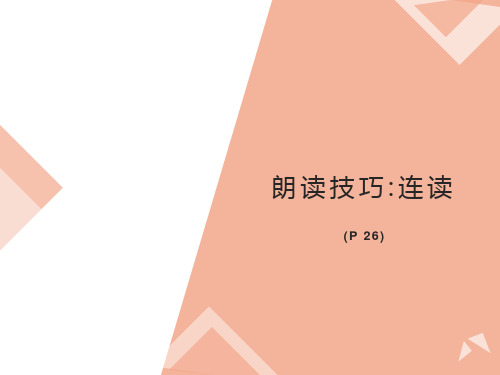
01 朗读技巧:语调
02 ( P 46 )
2
降调(↘)
4
平调(→)
基本语调:升 调(↗)
1
升降调(∧)
3
降升调(∨)
5
语调的用法:
升调:主要用于一般疑问句,带有 疑问语气;也可用于祈使句,表示 委婉、客气;或用于陈述句,表示 疑问,不肯定或不耐烦等。如:
○ Can you come to us for lunch?↗
朗读技巧:连读
(P 26)
在连贯地说话或朗读时,在同一个意群(即 短语或从句)中,如果相邻的两个词前者以 辅音音素结尾,后者以元音音素开头,就 要自然地将辅音和元音相拼,构成一个音 节,这就是连读。连读时的音节一般不重 读,只需顺其自然地一带而过,不可以加 音,也不可以读得太重。
︵ ︵
以下几种情况常要连读
【模仿朗读】模仿朗读下列短文,注意意 群停顿。
Geroge is a young man. He does not have a wife, ∕but he has a very big dog∕—and he has a very small car too. He likes playing tennis. Last Monday∕ he played tennis∕for an hour∕ at his club, and then he ran out∕ and jumped into a car. His dog came after him,∕ but did not jump into the same car;∕ it jumped into the next one.
(1)Tonny only walks a few steps/from his office/to the place/where his wife works.
英语语音语调ppt课件
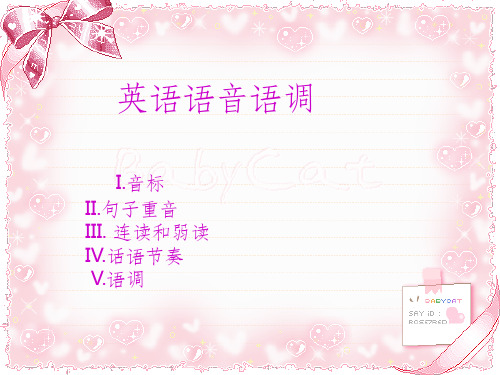
/tʃ/ 双唇略微张开突出,舌尖抵住上齿龈,用力吐气,
声带不振动。 eg: charm(魅力),change(改变),cheer(喝彩)
/dʒ/ 和/tʃ/ 发音相似,双唇略微张开突出,舌尖抵住上齿
龈,用力吐气,但声带需振动。 eg: change(改变),job(工作),joke(玩笑)
精选课件
逻辑重音
• 句子的重音总是要表现说话人的思想和他 所要表达的意思的重点。有时为了强调, 句子中几乎任何词都可以有句子重音,包 括一些通常没有句子重音的词,这种依说 话者意图重读的音就是逻辑重音。
精选课件
• Did you tell my ‘wife? • Did you tell ‘my wife? • Did ‘you tell my wife?
精选课件
8、/ɪə/ /eə/ /ʊə/ / j/ / w/
/ɪə/ 由/ɪ/和 /ə/两个单音组成,前重后轻,双唇始终半
开。 eg: dear(亲爱的),beer(啤酒), hear(听到)
/eə/ 由/e/和/ə/两个单音组成,前重后轻,舌端抵下齿,
双唇半开。 eg: care(关心),share(分享),bear(熊)
精选课件
3、/ɑ:/ /ɔ:/ /ɔ/ /s/ /z/ /θ/ /ð/
/ɑ:/ 长元音,口腔打开,嘴张大,舌身放平,舌尖不抵
下齿,下巴放低,轻松发音。 eg: car(小汽车),art(艺术),bath(洗澡)
/ɔ:/ 长元音,双唇收得小而圆,并向前突出,舌身往后
缩。 eg: sort(种类),talk(谈话),ball(球,舞会)
/n/ 双唇微开,舌尖抵上齿龈,气流从鼻孔里出来,声
带振动。 eg: need(需要),thin(瘦的),morning(早上)
美丽英文天籁之声英语气息朗读法精品PPT课件

• 例二: • 原句:I absolutely must travel around the word
at some point in my life. • 字体改变与符号标注:
•
• I absolutely must travel around the world at
• (最高音) (屏气停顿)
like to make a lost baggage report.
• 字体改变与符号标注:
•
• We may have lost some baggage Vso we'd like
•
(最高音)
(气息
完成并换气)
• to make a lost baggage report.
•
(连读)
部吐完)
(气息全
• some point in my life.
•
ቤተ መጻሕፍቲ ባይዱ
(连读)(气息全部吐完)
• 字体改变与符号标注朗读说明:
• 如上例一所示,
• (1)所有斜体的英语单词“We may have,some, so we‘d,to,a”朗读时,要求“最快速朗读、音量
低至朗读者本人能听清即可”;
• (2)单词“lost”上方的符号“
• I watched you die I heard you cry every night in your sleep I was so young you should have known better than to lean on me you never thought of anyone else you just saw your pain and now I cry in the middle of the night over the same damn thing because of you I never stray too far from the sidewalk because of you I learned to play on the safe side so I don't get hurt
英语语音知识 发音规则 PPT

★特殊连读---一箭双雕
⑴/r/ a number of , for instance ; ⑵/n/ in an hour , on a sunny day; ⑶/l/ fall on sleep, all of a sudden
3. 缩读
两个或两个以上单词读音的合并现象.
①They have→They’ve; ②They are
→They’re
③He is →He’s
④are not →aren’t
3. 最常见缩读词组总结
⑴are you →ya
☆Where ya going?
⑵does she →dushi
☆Dushi speak English?
英语语音知识 专题讲解
造成语音障碍的两大原因
1.准确程度不够 2.练习程度不够
克服语音障碍的三大途径
1.提升语音面貌 2.多听多说多练习 3.熟悉发音规则
Unit 1 英语音标基础知识
1、IPA 是International Phonetic Alphabet(国 际音标),即英国音标。
2、 K.K是美国音标。
⑴/t/+/j/--/tʃ/
①Nice to meet you ②Fit you well ③Last year
⑵/d/+/j/ → /ʤ/
①We need you. ②Would you please sit down? ③Hide yourself.
⑶/s/+/j/ → /ʃ/
英语的语音和语调ppt课件
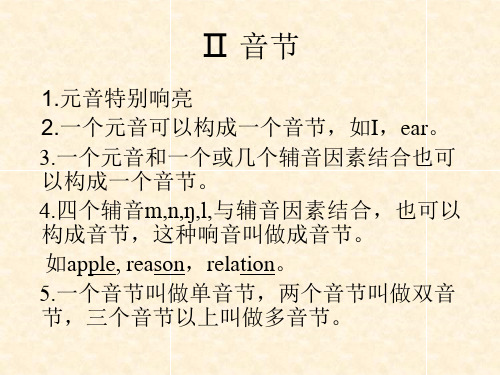
元音字母后面有辅音字母(辅音字母r除外), 还有一个无声的字母e,如face, like, code, cute.
• 在重读开音节中,元音字母a, e, i, o, u 都读它 们字母表的音名。a读作/ei/, e读作/i:/,i读作 /ai/,o读作/əu/ ,u 读作/ju:/ 或/u:/
认识到了贫困户贫困的根本原因,才 能开始 对症下 药,然 后药到 病除。 近年来 国家对 扶贫工 作高度 重视, 已经展 开了“ 精准扶 贫”项 目
Ⅴ 话语节奏Rhythm of English
• 一般语句中,重读和非重读音节相继出现。
• 重读音节相继出现的地方,通常语速会慢一些, 音节听起来也清楚一些。
认识到了贫困户贫困的根本原因,才 能开始 对症下 药,然 后药到 病除。 近年来 国家对 扶贫工 作高度 重视, 已经展 开了“ 精准扶 贫”项 目
认识到了贫困户贫困的根本原因,才 能开始 对症下 药,然 后药到 病除。 近年来 国家对 扶贫工 作高度 重视, 已经展 开了“ 精准扶 贫”项 目
认识到了贫困户贫困的根本原因,才 能开始 对症下 药,然 后药到 病除。 近年来 国家对 扶贫工 作高度 重视, 已经展 开了“ 精准扶 贫”项 目
认识到了贫困户贫困的根本原因,才 能开始 对症下 药,然 后药到 病除。 近年来 国家对 扶贫工 作高度 重视, 已经展 开了“ 精准扶 贫”项 目
认识到了贫困户贫困的根本原因,才 能开始 对症下 药,然 后药到 病除。 近年来 国家对 扶贫工 作高度 重视, 已经展 开了“ 精准扶 贫”项 目
Ⅱ 音节
1.元音特别响亮
2.一个元音可以构成一个音节,如I,ear。
3.一个元音和一个或几个辅音因素结合也可 以构成一个音节。
英语语音教学-ppt课件

[ ][ ] ❖ [ ][ ]
[ ][ ][ ] ❖ [ ][ ] ❖ [ ][ ]
❖
元音音标:〔24〕
❖ 短元音:( [ ]/[ ]) [ ] [ ] [ ][ ][ ] [u]/[ ])
❖
❖ 长元音: [ :][ :][ :] [ :][ :]
bat, hat, cap, map, bag, can, man, back, thank, stand, hand, panda, hamburger apple, animal, camel, happy, Saturday
[ ]音的盲点与辨析
❖ 圆唇扁唇化:bag-[b] cat-[et] ❖ 单元音双元音化:back-[ba] black-[bla] ❖ 他音化:thank-[nk] stand-[stnd]
❖ [ ] 位于非重读音节末尾。发音时唇、舌 略松弛。较之[ ]音发音时舌位略靠前, 发音较轻。是紧口音。
❖ busy, easy, teddy, city, party, naughty,
❖ monkey, worry, hungry, lovely, merrily
单元音 [ ] [ ] 的盲点
hamburger-[hmb:] ❖ 母语化:读成中文的‘哀’,如: ❖ apple- [哀pl], camel- [开ml], ❖ saturday – 塞turday ❖ 缘由:口型未控制好,齿间间距或过大或过小,舌
位不到位;发音部位或太靠前或太靠后。
发音练习
❖ Tongue twister: ❖ Cat, cat, catch that black rat!
❖ 3.他音化:girl-[g l]
- 1、下载文档前请自行甄别文档内容的完整性,平台不提供额外的编辑、内容补充、找答案等附加服务。
- 2、"仅部分预览"的文档,不可在线预览部分如存在完整性等问题,可反馈申请退款(可完整预览的文档不适用该条件!)。
- 3、如文档侵犯您的权益,请联系客服反馈,我们会尽快为您处理(人工客服工作时间:9:00-18:30)。
2. 一般疑问句升调的训练要领: 特殊疑问句在通常情 况下使用降调,但仅了解这一点是不够的。实际上, 特殊疑问句的音调变化是有规律可循的,以下列句为 例: • Where were you born? • Which countries have you been to? • Which university did you graduate? • Why are you learning English? 我们发现整个句子的 语调如下曲线图: 起调时,特殊疑问句的音调较高, 遇到助动词时弱读,并且将音调降下来,然后渐渐提 高,一般在句子的最后一个单词重重地降下来。 Which university did you graduate? Why are you learning English?
a. In general, we emphasize a word as we stress a syllable by giv ing it more force, longer duration, and higher pitch.
b. I believe the course I have followed with China is the one that ’s best for America, disagreeing where we have serious disagree ments, pursuing our common interests where I thought it was in the interest of the United States. (Bill Clinton)
技巧一:如何处理句子中的升调
1. 英语中的升调一般用于: a. 一般疑问句,如: Do you come here a lot? ↗ Have you been to any foreign countries? ↗ b. 选择疑问句的前半部分,如: Is she an English teacher ↗ or Chinese teacher? ↘ Are you here for the tickets ↗ or books? ↘ c. 若干相同类目的词语并列出现时,除最后一项外, 如: I want to low fat yogurt, ↗tuna salad,↗ chocolate cake ↗ and hamburger special.
.
d. 选择疑问句的最后一个选项,如: Do you prefer hand-written letter ↗ or Email? ↘ Does she raise rats ↗ or rabbits? ↘ e. 并列出现的若干相同类目词语的最后一项, 如: I want a house with a dining room, ↗ two bedrooms, ↗a bath ↗and a basement. ↘
.
• 3. 情感重音是指说话人在处于极为激动的 情况下,对某个能表达其情感的词或词组 给予超常规的强调。如: We Chinese people are unconquerable.
.
技巧四:如何处理助动词的弱读
.
技巧二:如何处理句子中的降调
1. 英语中的降调一般用于: a. 特殊疑问 What have all the flowers gone? ↘ What the hell did he do? ↘ b. 感叹句: What a game! ↘ What depressing information! ↘ c. 反义疑问句中,当说话人对自己所说的内容已 经很确定,知识象征性地与对方确认一下时: We will live in a global village, aren’t we? ↘ A small world, isn’t it? ↘
.
语句重音(sentence stress)是指根据不同的交际需要而对
句子的某个或者某些词加以强调。
重音的特点是:发音用力较多,音量较大,时间较长。
重音分为:表意重音,逻辑重音及情感重音。
1. 表意重音:表意重音是指讲话人在没有受个人情感影响或 没有特意将句中的某一信息加以强调的情况下,对句中所有 实词一视同仁地加以强调。实词包括:名词、动词、形容词、 副词、数词、指示代词、疑问代词等;虚词包括:介词、冠 词、助动词、连词、人称代词等。如:
.
2.逻辑重音:逻辑重音又叫对比重音,指讲话人有意将句 中的某个成分(一般只有一个,但也有两个的情况)与上 下文当中的另一个成分相对比而给予的特殊强调。此时, 句中本来该重读的实词被读得快而弱,本来该弱读的虚词 被减弱到几乎听不出来的程度。试比较下组7个句子:
1. I suggest you talk to her this evening. 2. I suggest you talk to her this evening. 3. I suggest you talk to her this evening. 4. I suggest you talk to her this evening. 5. I suggest you talk to her this evening. 6. I suggest you talk to her this evening. 7. I suggest you talk to her this evening.
.
My ideal man must be handsome, ↗ generous, ↗ dependable ↗ and considerate.
d. 表示疑问的陈述句, 如: You want a cup of coffee? ↗ You don’t work here? ↗ e. 表现祝贺,同情,或热情时: 如 Congratulations! ↗ I’m sorry to hear that. ↗ Have a nice weekend. ↗
